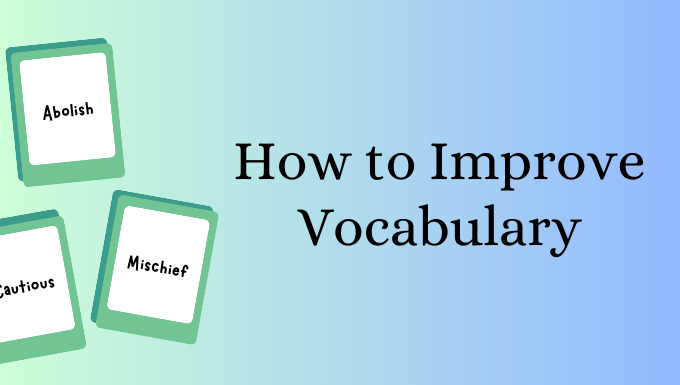
Table of Contents
Ever felt stuck while trying to express yourself because you couldn’t find the right word? Expanding your vocabulary can not only help in expressing your thoughts more clearly but also enhance your communication skills, both personally and professionally. In this blog post, we’ll explore some simple yet effective methods to improve your vocabulary. Let’s dive in!
10 Proven Ways to Improve Vocabulary
Enhancing your word power is easier than you think! We’ll share 10 practical and fun ways to expand your vocabulary. These tips are easy to follow and can fit into anyone’s daily routine, making the journey of learning new words both enjoyable and effective. Let’s dive in and start building a richer vocabulary today!
1. Read Regularly:
One of the best ways to improve vocabulary is through reading. Whether it’s books, newspapers, blogs, or magazines, reading exposes you to a rich array of words. Try to diversify your reading materials to encounter a wider range of vocabulary.
2. Use a Dictionary and Thesaurus:
Keep a dictionary and thesaurus handy. Nowadays, there are many apps available for this purpose. Whenever you come across a new word, look it up. A thesaurus can also help you find synonyms, which are words with similar meanings, broadening your word knowledge.
3. Start a Vocabulary Journal:
Whenever you learn a new word, write it down in a journal. Note its meaning, pronunciation, and try to use it in a sentence. This practice helps in retaining new words more effectively.
4. Play Word Games:
Engage in word games like Scrabble, Boggle, or crossword puzzles. These games are not only fun but also a great way to learn new words.
5. Use New Words in Daily Conversation:
Try to use the new words you learn in your daily conversations. This helps in reinforcing your memory and makes you more comfortable with using a diverse vocabulary.
6. Listen and Learn:
Listening is as important as reading when it comes to vocabulary building. Listen to podcasts, watch documentaries, or follow interesting talks on various topics. Pay attention to new words and phrases used by speakers.
7. Set Realistic Goals:
Set small, achievable goals like learning one or two new words per day. This makes the process of enhancing your vocabulary less overwhelming and more manageable.
8. Learn a Word a Day:
Many websites and apps offer a ‘word of the day’ feature. Subscribe to these and make it a habit to learn the daily word they provide. This is a simple yet effective way to gradually expand your vocabulary.
9. Understand the Context:
Always try to understand the context in which a word is used. This helps in grasping not just the meaning of the word, but also how it is used in different situations.
10. Be Persistent:
Improving your vocabulary is a gradual process. Be patient and persistent. The more regularly you practice, the better your vocabulary will become.
Conclusion:
Enhancing your vocabulary doesn’t have to be a daunting task. With these simple and enjoyable strategies, you can gradually build a richer and more varied vocabulary. Remember, the key is consistency and practice. Happy learning!
By following these tips, anyone can improve their vocabulary in a fun and effective way. Whether you’re a student, a professional, or just someone looking to refine your communication skills, these methods are applicable and beneficial. Start today and watch your vocabulary grow!
How to Improve Vocabulary FAQs
FAQ 1: How can I effectively improve vocabulary on a daily basis?
- Answer:
To effectively improve your vocabulary daily, try incorporating a few simple habits: read diverse materials regularly, use a dictionary and thesaurus to learn new words and their synonyms, and practice using new words in your daily conversations. Additionally, writing down new words and their meanings can reinforce your learning.
FAQ 2: Are there any tools or apps that can help to improve vocabulary?
- Answer:
Yes, there are many tools and apps designed to help improve vocabulary. Dictionary apps, vocabulary builder apps, and word-of-the-day apps are great for learning new words. Additionally, playing word games like Scrabble or using flashcard apps can also be beneficial.
FAQ 3: How important is it to understand the context when learning new words?
- Answer:
Understanding the context in which a new word is used is crucial. It helps you grasp not only the meaning of the word but also how it can be appropriately used in different sentences and scenarios. Contextual learning promotes deeper understanding and better retention of new vocabulary.